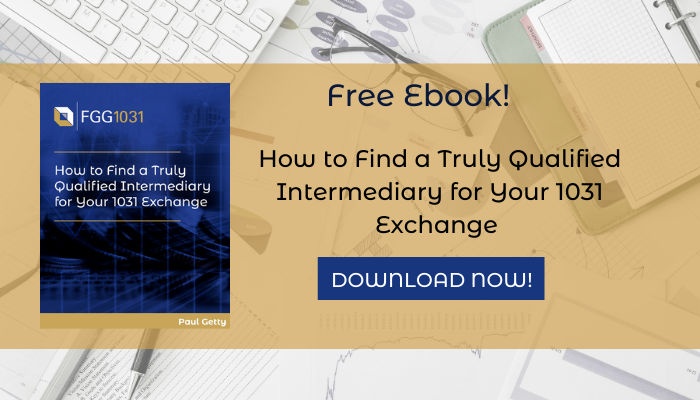For investment property owners using a 1031 exchange to sell a property, the IRS generally requires that a Qualified Intermediary (QI) be used to facilitate the exchange. This is often a point of confusion for many investors, as they may not be familiar with the role of a QI or the qualifications they should consider when selecting one. This post will help you understand the QI's primary responsibilities and the characteristics you should look for in finding the right QI for your exchange.
What is a QI?
A Qualified Intermediary, also known as an Accommodator or Facilitator, is a person or entity that facilitates 1031 exchange transactions on behalf of the taxpayer as defined under Treas. Reg. §1.1031(k)-1(g)(4).
It is important to know that you cannot act as your own QI, and neither can any of your "agents." Those include your real estate agent or broker, your accountant, attorney, employees, or anyone who has worked for you in any capacity within the last two years.
The essential role of the QI is to act as the exchanger's intermediary and prevent the exchanger from accessing funds transferred during the exchange process. The QI performs several other vital roles in facilitating the exchange process, including:
- Working with the seller and their financial advisor on the 1031 exchange structure
- Preparing all transaction documents related to the sale of the relinquished property and the purchase of replacement property.
- Taking possession and holding the funds from the sale of the relinquished property
- Depositing those funds for the replacement property sale and holding them in escrow during the 45-day identification period
- Receiving and holding the written information about potential replacement properties
- Transferring funds for the purchase when the replacement asset has been selected.
- Providing a complete accounting of the 1031 exchange to the seller.
How to Select a QI?
For 1031 exchangers, it is critical to select a QI carefully because there have been instances where less experienced and "unqualified" QIs have failed to fulfill their responsibilities, and exchanges have been disqualified. In rarer instances, there have also been cases of fraud. That is why you need to understand the questions to ask of a QI when determining who you will use for your exchange. Here are several key areas to explore in your due diligence process.
First off, begin by asking a QI candidate if they are a member in good standing with the Federation of Exchange Accommodators. It is not a requirement that a QI is part of this association, but this non-profit organization is viewed as an industry benchmark and holds high standards that its members are expected to meet. Next, ask candidates these questions:
How many years have you been facilitating 1031 exchanges, and how many have you completed in each of the last five years? This question will help ascertain that the QI has been practicing for years and through many market cycles and has been active recently.
What is the largest exchange you have facilitated, and what is the average value of your exchanges over the last five years? This question will help you understand if the QI has handled large complex exchanges and if the QI has worked on exchanges like yours.
Can you provide evidence of your E&O (errors and omission) insurance policy as well as your fidelity bonds? This question will help you identify if the QI has the proper insurance and bonding in place to protect you if something goes awry with your exchanges.
Have you ever had 1031 exchanges that were not completed, and if so, what was the cause? This is a fair question because the 1031 exchange process can be complex, and challenges can often arise. A QI which is forthright in discussing these situations is offering the transparency and honesty that may be important to you.
Where will the proceeds from the relinquished property be held? You should expect the funds will be held in an insured escrow account at a reputable bank. If a QI declares bankruptcy during the exchange process, you want to ensure your funds are protected.
Can you provide your written policies and procedures that highlight your internal controls? This is important to ask because it will help reveal the QI's attention to detail and provide you with a roadmap of the necessary steps they intend to guide you through.
What is your experience with Delaware Statutory Trusts (DST) as a like-kind investment option for 1031 exchangers? DSTs have become a more popular investment approach for 1031 exchangers, and the QI should have broad experience with these fractional interest investments.
At First Guardian Group, we have worked with 1031 exchange clients for over the past eighteen years. We have developed excellent relationships with what we believe are many of the most experienced Qualified Intermediaries.
Please let us know if you would like us to introduce you to a few, and also, don't hesitate to call us at (866) 398-1031if we can assist with your exchange.
Help Save 1031 Exchanges.
Have you downloaded our latest Ebook?
References:








Your Comments :